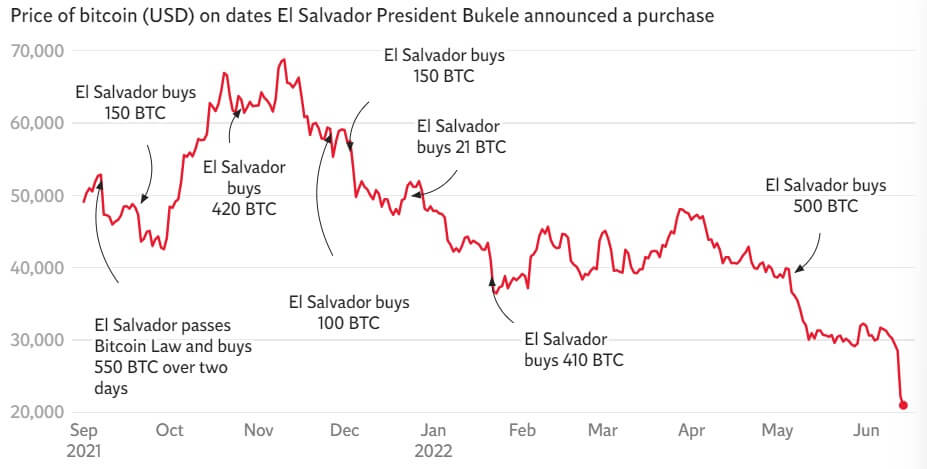El Salvador’s Bitcoin reserves diminished by 50% and lost more than $50 million with the recent Bitcoin price fall writes CryptoSlate’s Zeynep.
Despite their gravity, El Salvador’s Finance Minister Alejandro Zelaya said the losses pose a minimal fiscal risk.
El Salvador bought over 2,300 Bitcoins at different prices after accepting the currency as a legal tender in September 2021.

Since then, El Salvador earned and lost in the short term. Both the Finance Minister and the President of El Salvador have been blamed for damaging the country’s financial health. However, Minister Zelaya confidently responded:
“When they tell me that the fiscal risk for El Salvador because of Bitcoin is really high, the only thing I can do is smile”
Bitcoin adoption in El Salvador
The International Monetary Fund (IMF) criticized El Salvador’s decision to accept Bitcoin as a legal tender and strongly advised against it. The IMF report listed the drawbacks of Bitcoin as:
“[Bitcoin] entails large risks for financial and market integrity, financial stability, and consumer protection. It also can create contingent liabilities.”
However, the country dismissed the IMF’s warnings. The country’s president and the finance minister are strong pro-Bitcoiners who believe Bitcoin is the future.
Moreover, Bitcoin reduces the country’s dependence on the U.S. Dollar, which is El Salvador’s only other official currency.
Highlights since adoption
In addition to believing in Bitcoin, the country already saw the positive impacts of adopting Bitcoin as a legal tender.
One month after legalizing the currency, the country generated some short-term revenue which was enough to build 20 new schools to educate society about cryptocurrencies.
Within a few months of adopting Bitcoin, El Salvador’s tourism sector boomed by 30% and generated more than $1,400 million of income.
Future Plans
To increase the Bitcoin adoption in the county, El Salvador is building a “Bitcoin City.”
The architectural model of the city shows that it will be placed near the Conchagua Volcano, taking up most of the hills. The city will also have a hexagonal center, an airport, and various key landmarks.
The county started working on the city as soon as it accepted Bitcoin as a legal tender in November 2021. El Salvador’s president posted the city’s model as an update in May 2022. For now, it is unknown when the construction will begin.
The geothermal energy the Conchagua Volcano provides will also be utilized in sustainable Bitcoin mining.
The Central African Republic
Following El Salvador’s footsteps, the Central African Republic (CAR) also adopted Bitcoin as a legal tender in April 2022.
The CAR’s President Faustin-Archange Touadéra expressed his fondness of Bitcoin and said:
“For us, the formal economy is no longer an option. An impenetrable bureaucracy keeps us stuck in systems that don’t give us the opportunity to be successful. Bitcoin opens a new path to a bright future.”
The IMF criticized CAR’s decision immediately after accepting Bitcoin as a legal tender. The IMF raised similar concerns to those it raised to El Salvador regarding volatility and integrity.
However, it wasn’t enough to convince CAR to revoke its decision. The country is currently working on establishing Africa’s first legal Bitcoin investment platform.
CAR’s president remains unfazed by the crypto market downturn
The president of Central African Republic hints at his continued support for bitcoin in a tweet despite the negative state of the crypto market according to Abdulrasaq Ariwoolas writing ii Cryptoslate.

The tweet is a reaction to the continued crypto winter, which has seen the total market valuation drop below $1 trillion. The president has been a long-term advocate, and his continued support seems strong despite the economic downturn.
CAR bitcoin adoption
On April 27th, 2021, the central African country announced its adoption of bitcoin as a legal tender. The move made it the first African country and the second in the world, after El Salvador, to legalize the use of Bitcoin.
In a released statement, the president’s office referred to the adoption as:
“a decisive step towards opening up new opportunities.”
Expectedly, the economic merits of the adoption drew a lot of criticism and concerns—most of the concerns centered on whether Bitcoin is likely to solve the country’s financial problems.
However, it is not publicly known if the country had acquired bitcoins and taken the same route as El Salvador. This is could have a considerable impact as the country is one of the poorest in the world.
Conversely, since September 2021, El Salvador has invested more than $104 million in bitcoin for its treasury. However, the country’s holding has halved in value due to the extreme market conditions.
Meanwhile, adoption in CAR, much like in El Salvador, has been slow. Nonetheless, the president of both countries continue to push with missionary zeal.
A catalyst for technological adoption
Despite its adoption, the war-torn country still lacks the technological infrastructure to support the bitcoin adoption. Therefore, it has held onto its crypto adoption as a likely catalyst for fast-paced development.
In a tweet on May 2022, the president announced plans for a project, “Sango,” which he said, “has the potential to reshape CAR’s financial system.” Sango, after completion, is expected to serve as a “legal Crypto Hub” for businesses and crypto-enthusiasts, the president said.
However, the project’s website offers little insight on how it would operate, leaving a lot of questions unanswered.
CAR recently signed a deal with neighboring Cameroon to share its fiber-optic network in 2023. In addition, it plans to install fiber-optic networks by the end of 2023 to improve technological access.

